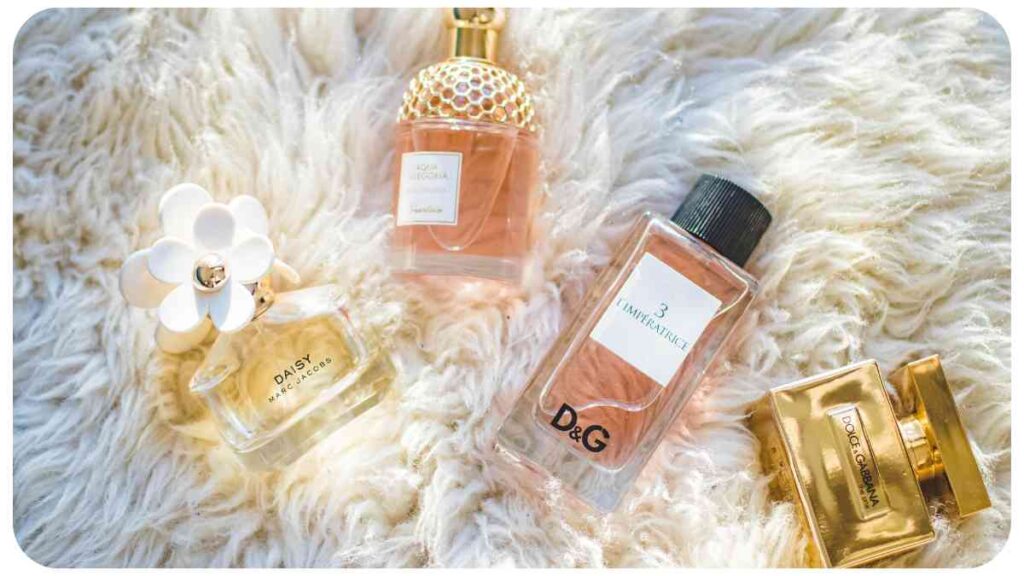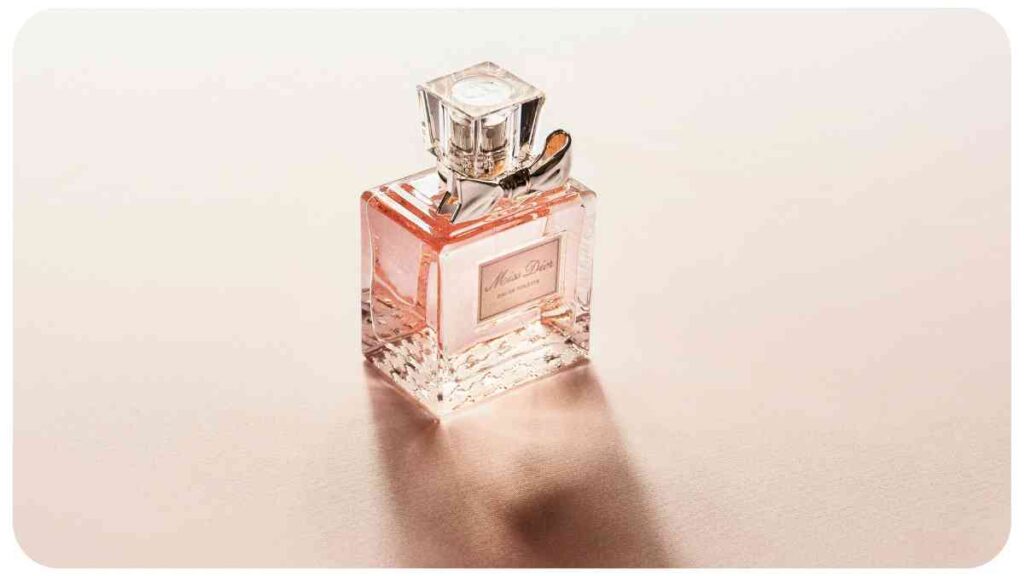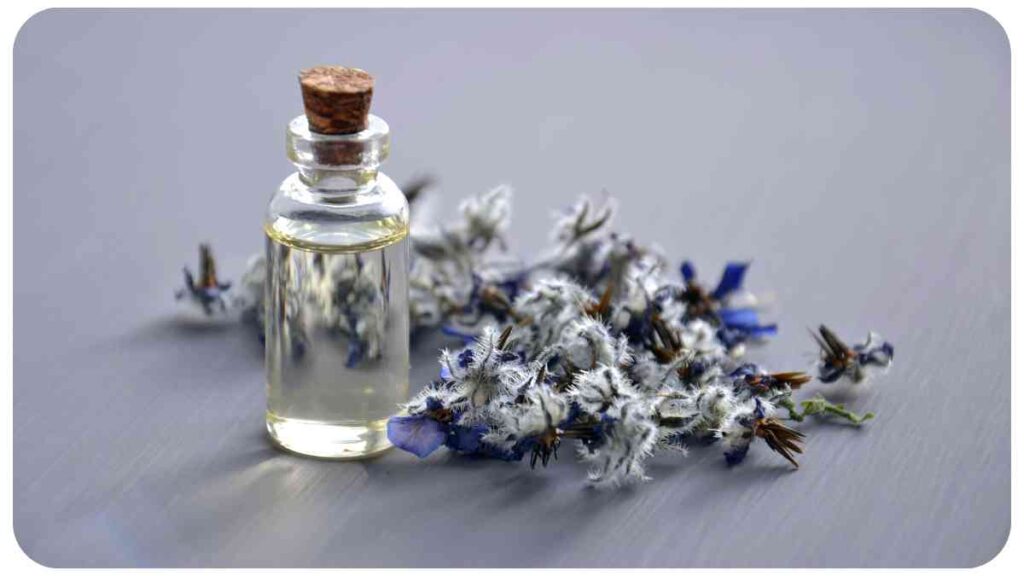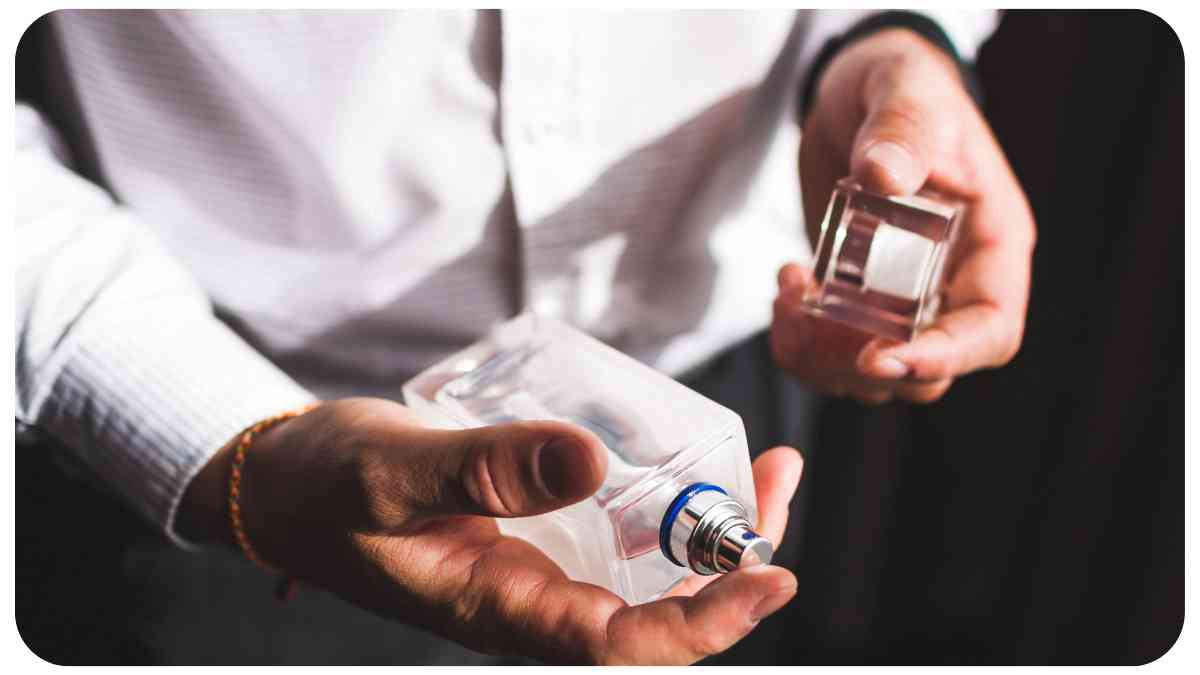Do you ever find yourself frustrated when your favorite perfume seems to fade away quickly, leaving you without the desired scent for the day? Understanding the factors that affect fragrance longevity can help you make informed choices when selecting and wearing perfumes.
In this article, we will delve into the intricacies of perfume concentration, fragrance notes, skin type, application techniques, storage conditions, and environmental factors to unravel the secrets of perfume longevity.
| Takeaways |
| Understanding the factors that affect perfume longevity helps you make informed choices. |
| Skin type, application techniques, and external factors can impact how long a scent lasts. |
| Oily skin tends to retain fragrance better, while dry skin may absorb it more quickly. |
| Applying perfume to moisturized skin and avoiding rubbing wrists together can enhance longevity. |
| Proper perfume storage in cool, dark places away from sunlight and extreme temperatures is crucial. |
| Layering scented products and reapplying strategically can prolong the life of your perfume. |
| Myths like more sprays equal longer-lasting fragrance should be dispelled for better results. |
| Some resources provide further insights and tips for making your perfume last longer. |
| Understanding these dynamics allows you to enjoy your fragrances to the fullest. |
Factors Affecting Perfume Longevity
To comprehend why some perfumes last longer than others, it is essential to consider various factors. By gaining insight into perfume concentration, fragrance notes, skin type, application techniques, storage conditions, and environmental factors, you can better understand the longevity of your favorite fragrances and make suitable choices accordingly.
When it comes to applying perfume, there are a few tips and tricks that can help you achieve a long-lasting scent. Check out this comprehensive guide to tips and tricks for long-lasting scent and make the most of your fragrances.
Perfume Concentration
The concentration of fragrance oils in a perfume significantly impacts its longevity. Perfumes with a higher concentration of oils tend to last longer on the skin, while those with a lower concentration fade more rapidly. Understanding the different perfume concentrations can help you select the right one for your desired level of longevity.
| Perfume Concentration | Description |
| Eau de Cologne | Contains the lowest concentration of fragrance oils, typically lasting for up to 3 hours. |
| Eau de Toilette | Offers a moderate concentration of fragrance oils, providing a longevity of approximately 4-6 hours. |
| Eau de Parfum | Contains a higher concentration of fragrance oils, lasting for about 6-8 hours. |
| Parfum | Boasts the highest concentration of fragrance oils, offering long-lasting scent for up to 12 hours or more. |
Fragrance Notes

The composition of a perfume consists of different fragrance notes, which unfold over time, contributing to its overall longevity. Understanding the different types of fragrance notes can help you select a perfume with notes that suit your preferences and desired staying power.
| Fragrance Note | Description |
| Top Notes | These are the initial scents that are detected immediately after application. They are usually light and uplifting but tend to evaporate quickly, lasting for about 15-30 minutes. |
| Heart Notes | Also known as middle or “character” notes, these scents develop after the top notes fade. They form the core of the fragrance and can last anywhere from a few hours to several hours. |
| Base Notes | These scents emerge after the heart notes and provide the foundation for the fragrance. They are typically rich and long-lasting, lingering on the skin for several hours, often even after the top and heart notes have dissipated. |
Understanding the different types of fragrance notes can help you choose a perfume with a combination that suits your preferences for both initial impact and long-lasting appeal.
Skin Type
Believe it or not, your skin type plays a significant role in how long a perfume lasts on you. Oily skin tends to hold fragrance better and for a longer time compared to dry skin. The natural oils on oily skin help retain fragrance molecules, enhancing their longevity. On the other hand, dry skin has a tendency to absorb fragrance more quickly, leading to faster fading. If you have dry skin, consider moisturizing before applying perfume to prolong its staying power.
Application Technique
The way you apply your perfume can affect its longevity. When applying, avoid rubbing your wrists together, as this creates friction and heat, causing the fragrance to evaporate faster. Instead, spray or dab the perfume on your pulse points, such as the wrists, neck, and behind the ears, and allow it to dry naturally. This technique helps the fragrance to develop and last longer.
Want to make maximum impact with your fragrances? Learn the art of layering fragrances to create unique scents that last for hours. Explore the ultimate guide to layering fragrances and master the art of fragrance composition.
Storage Conditions
Proper storage of your perfumes is crucial for maintaining their longevity. Exposure to light, heat, and air can degrade the fragrance over time. Store your perfumes in cool, dark places, away from direct sunlight and extreme temperatures. Keep the perfume bottles tightly closed to prevent air exposure, which can lead to oxidation and alteration of the scent.
Environmental Factors
External environmental factors can also impact the longevity of your perfume. Heat and humidity can accelerate the evaporation of fragrance molecules, causing the scent to fade faster. Additionally, activities such as sweating and physical exertion can affect the staying power of perfume. Consider these factors when choosing the right fragrance for specific occasions or climates.
Now that we have explored the various factors affecting perfume longevity, let’s delve deeper into each aspect to gain a comprehensive understanding of fragrance preservation and enhancement.
Understanding Perfume Concentration

Perfume concentration refers to the amount of fragrance oils present in a perfume composition. It plays a vital role in determining the longevity of the scent on your skin. Different perfume concentrations offer varying levels of intensity and longevity. Let’s take a closer look at each concentration:
- Eau de Cologne: With the lowest concentration of fragrance oils, eau de cologne typically lasts for up to 3 hours. It is perfect for a refreshing burst of fragrance, ideal for shorter outings or as a quick pick-me-up throughout the day.
- Eau de Toilette: Offering a moderate concentration of fragrance oils, eau de toilette provides a longevity of approximately 4-6 hours. It is a popular and versatile choice for everyday wear, suitable for various occasions.
- Eau de Parfum: With a higher concentration of fragrance oils, eau de parfum lasts for about 6-8 hours. This concentration is known for its enhanced longevity, making it well-suited for occasions that require a longer-lasting scent.
- Parfum: Boasting the highest concentration of fragrance oils, parfum offers a long-lasting scent that can linger on the skin for up to 12 hours or more. This concentration is perfect for special events or when you desire a fragrance that will stay with you throughout the day or evening.
While selecting a perfume, consider your personal preferences, the desired intensity, and the occasion to choose the concentration that best suits your needs.
Fragrance Notes and Longevity
The composition of a perfume consists of multiple fragrance notes that evolve over time, contributing to its overall longevity. Understanding the characteristics and lifespan of different fragrance notes can help you make informed choices when selecting a perfume.
Top Notes
Top notes are the initial scents that are detected immediately after applying the perfume. They form the introductory impression and usually consist of light and fresh notes such as citrus, fruits, or herbs. While top notes provide an immediate burst of fragrance, they tend to evaporate quickly, lasting for about 15-30 minutes.
Heart Notes
Also known as middle notes or “character” notes, heart notes emerge after the top notes fade. They form the core of the fragrance and contribute to its overall character. Heart notes are often floral or spicy, adding depth and complexity to the perfume. These notes can last anywhere from a few hours to several hours, depending on the specific fragrance composition.
Achieving perfectly hydrated skin is essential for enhancing fragrance longevity. Discover the skincare routine for perfectly hydrated skin and unlock the secret to longer-lasting scents that blend beautifully with your skin.
Base Notes
Base notes provide the foundation for the fragrance and emerge after the heart notes. They are typically rich and long-lasting, consisting of deep and earthy scents like woods, musk, or vanilla. Base notes have a slower evaporation rate compared to top and heart notes, lingering on the skin for several hours, often even after the initial notes have dissipated.
Understanding the different fragrance notes helps you appreciate the scent’s development over time and choose perfumes that align with your desired lasting effect.
| Fragrance Note | Example Scents |
| Top Notes | Bergamot, Lemon, Orange, Lavender, Mint |
| Heart Notes | Rose, Jasmine, Cinnamon, Nutmeg, Geranium |
| Base Notes | Patchouli, Sandalwood, Vanilla, Amber, Musk |
Consider the interplay between these notes when choosing a perfume. Fragrances with a well-balanced combination of top, heart, and base notes tend to have a longer-lasting scent experience, as each note unfolds and lingers on the skin.
Impact of Skin Type on Perfume Longevity
Understanding your skin type is crucial in determining how long a fragrance will last on your skin. Oily skin tends to retain and release fragrance molecules more effectively, leading to prolonged longevity. The natural oils in oily skin create a better environment for fragrances to adhere to, enhancing their staying power. If you have oily skin, you may notice that perfumes tend to last longer on you.
On the other hand, individuals with dry skin may experience fragrances fading more quickly. Dry skin has a tendency to absorb fragrance molecules faster, resulting in a shorter lifespan of scents. If you have dry skin, consider moisturizing before applying perfume to create a barrier that helps retain fragrance on your skin for a longer duration.
Looking for new fragrance options? Dive into the world of exquisite scents with the top 15 fragrances every man should own. Enhance your collection and find the perfect long-lasting fragrance that matches your style.
Application Techniques for Long-lasting Fragrance
The way you apply your perfume significantly impacts its longevity and overall impact. Follow these tips to maximize the staying power of your favorite scents:
- Spray or dab on pulse points: Apply perfume to your pulse points, such as your wrists, neck, and behind the ears. These areas produce heat, which helps to release the fragrance gradually throughout the day.
- Avoid rubbing: When applying perfume, avoid rubbing your wrists together. Rubbing creates friction and generates heat, causing the fragrance to evaporate more quickly.
- Layer your fragrance: Consider using complementary scented products like body moisturizers or lotions that are created to be used with the perfume. Layering your fragrance can help intensify and prolong the scent.
- Reapply strategically: If you find your fragrance fading, carry a travel-sized bottle or sample with you for touch-ups throughout the day. However, be mindful of others’ sensitivities and avoid over-applying in shared spaces.
By adopting these techniques, you can make the most of your perfumes and enjoy long-lasting fragrance throughout your day.
Proper Storage for Perfume Preservation
Proper storage is essential for maintaining the quality and longevity of your perfumes. Exposure to light, heat, and air can negatively impact the fragrance, leading to oxidation and degradation. Follow these tips to ensure your perfumes retain their original scent for as long as possible:
- Keep perfume away from direct sunlight: Ultraviolet (UV) rays can break down the chemical compounds in perfume, resulting in alteration of the fragrance. Store your perfumes in cool, dark places, such as a drawer or a perfume cabinet, to minimize exposure to sunlight.
- Avoid extreme temperatures: High temperatures can accelerate the evaporation process, while low temperatures can affect the chemical composition of the fragrance. Keep your perfumes away from heat sources and avoid storing them in areas prone to extreme temperature fluctuations.
- Seal the perfume bottles tightly: Exposure to air can lead to oxidation and degradation of the fragrance. Always ensure the perfume bottle is tightly closed after each use to minimize air exposure. This preserves the freshness and longevity of the fragrance.
- Transfer perfume to smaller bottles: If you have a large perfume bottle that is only partially filled, consider transferring the remaining fragrance to a smaller, airtight bottle. This reduces the amount of air in contact with the perfume, preserving its quality and reducing the risk of evaporation.
Taking care of your perfumes by providing them with suitable storage conditions ensures that they maintain their integrity and longevity, allowing you to enjoy them to the fullest.
External Factors Affecting Perfume Longevity

Apart from personal factors like skin type and application technique, external factors can also impact the longevity of your perfume. Here are a few key considerations:
- Humidity: High levels of humidity can speed up the evaporation of fragrance molecules, causing the scent to fade more quickly. Consider choosing lighter, fresher perfumes for humid environments.
- Heat: Heat can accelerate the evaporation process, affecting the staying power of the fragrance. In hot weather or during physical activities, opt for long-lasting fragrances or consider carrying a travel-sized bottle for reapplication.
- Sweating: Perspiration can interact with perfumes, altering their scent and reducing their longevity. If you tend to sweat heavily, choose fragrances that are designed to withstand the effects of perspiration.
- Clothing choice: Fabrics can absorb and retain fragrance, prolonging its lifespan. Spraying perfume on clothing can provide a longer-lasting scent compared to direct application to the skin. However, be cautious with delicate fabrics, as some fragrances may stain or damage certain materials.
By considering these external factors, you can make more informed choices about the perfumes you wear and their expected longevity in different environments.
Myth vs. Reality: Common Misconceptions about Scent Fading
There are several common misconceptions surrounding the fading of fragrances. Let’s explore some of these myths and separate them from reality:
Myth 1: More sprays mean longer-lasting fragrance.
- Reality: Applying an excessive amount of perfume does not necessarily make the scent last longer. Overapplication can overwhelm the senses and lead to desensitization. It’s better to apply the appropriate amount to your pulse points and let the fragrance develop naturally.
Myth 2: Rubbing wrists together helps the fragrance last longer.
- Reality: Rubbing your wrists together after applying perfume generates heat and friction, which can cause the top notes to evaporate more quickly. Instead, allow the fragrance to dry naturally on your skin for better longevity.
Myth 3: All perfumes have unlimited shelf life.
- Reality: Perfumes, like any other product, have a limited shelf life. Over time, they may degrade, resulting in changes to the scent and overall quality. It’s best to use perfumes within two to three years of opening, although some higher-concentration perfumes may last longer.
By debunking these myths and understanding the reality behind fragrance longevity, you can make more informed decisions about wearing and preserving your perfumes.
Choosing the right fragrance that aligns with your personality is key to enjoying a long-lasting scent. Uncover 10 secrets for choosing the perfect fragrance for your personality, and let your scent reflect your true self.
Tips for Enhancing Perfume Longevity
To enhance the longevity of your perfumes and ensure that they last throughout the day, consider the following tips:
- Choose perfumes with higher concentrations of fragrance oils, such as eau de parfum or parfum, as they tend to offer longer-lasting scents.
- Layer your fragrance by using scented body lotions or matching perfumed products that complement your chosen perfume.
- Apply perfume to well-moisturized skin, as dry skin tends to absorb fragrance more quickly.
- Avoid applying perfume to areas where you sweat heavily, as perspiration can interact with the fragrance and alter its scent.
- Store your perfumes in cool, dark places away from direct sunlight and extreme temperature fluctuations to maintain their freshness and integrity.
- Reapply your fragrance strategically throughout the day, especially on pulse points, for a refreshing boost of scent.
Following these tips can help you optimize the staying power of your perfumes and ensure that you enjoy their fragrances for longer periods.
Examples of Long-lasting Fragrances
While individual preferences vary, some perfumes are known for their longevity. Here are a few examples of fragrances that are often praised for their long-lasting scents:
- Chanel Coco Mademoiselle (Eau de Parfum)
- Dior J’adore (Eau de Parfum)
- Tom Ford Black Orchid (Parfum)
- Guerlain Shalimar (Eau de Parfum)
- Yves Saint Laurent Black Opium (Eau de Parfum)
Remember that perfume preferences are subjective, and what works well for one person may differ for another. Exploring different fragrance options and finding scents that align with your personal taste and desired longevity is key to selecting the perfect fragrance.
Conclusion
Understanding the various factors that impact perfume longevity empowers you to make informed choices when selecting, wearing, and storing your fragrances. From considering perfume concentration, fragrance notes, and skin type, to exploring application techniques and proper storage conditions, each factor plays a role in determining how long a scent will last.
Evaluate your preferences, personal factors, and the environmental conditions in which you will be wearing the perfume to find a balance that suits your desires. By understanding these dynamics, you can enjoy the enchanting world of fragrances to the fullest, ensuring that your chosen scents accompany you throughout the day.
Further Reading
Here are some additional resources you can explore to learn more about perfume longevity:
Make Your Perfume Last Longer: This blog post provides practical tips and techniques to extend the longevity of your perfume and make it last throughout the day.
Why Does My Perfume Fade So Quickly?: This Quora thread discusses possible reasons why perfumes may fade quickly on certain individuals and offers insights into maximizing fragrance longevity.
Why Does Your Perfume Fade So Quickly?: This article explores different factors that affect perfume longevity, such as skin type, application techniques, and external environmental factors.
FAQs
Here are some frequently asked questions about perfume longevity:
How can I make my perfume last longer on my skin?
There are several ways you can enhance the longevity of your perfume on your skin. Applying it to well-moisturized skin, choosing fragrances with higher concentrations, and strategically reapplying throughout the day can all help prolong the scent.
Why does perfume fade more quickly on some people?
Perfume can fade more quickly on individuals with dry skin as it tends to absorb fragrance molecules faster. Oily skin can help retain and release fragrance more effectively, resulting in longer-lasting scents.
Does the concentration of a perfume affect its longevity?
Yes, the concentration of a perfume plays a significant role in its longevity. Higher concentrations like eau de parfum and parfum generally last longer than lower concentrations such as eau de cologne or eau de toilette.
How should I store my perfumes to maintain their longevity?
To preserve the quality and longevity of your perfumes, store them in cool, dark places away from direct sunlight and extreme temperature fluctuations. Ensure the bottles are tightly sealed to minimize air exposure.
Can using scented body lotions help prolong the life of my perfume?
Yes, using scented body lotions or matching perfumed products that complement your perfume can help layer the fragrance and extend its longevity on your skin. However, be cautious with delicate fabrics, as some fragrances may stain or damage certain materials.

Hi, you! I’m Hellen James. I’m a beauty and fashion writer who loves to make the world a little more stylish and I’d love for you to join me in the fun! I’ve been writing about beauty and fashion since I was a kid, but it wasn’t until recently that I really knew what it meant to be a real expert.

